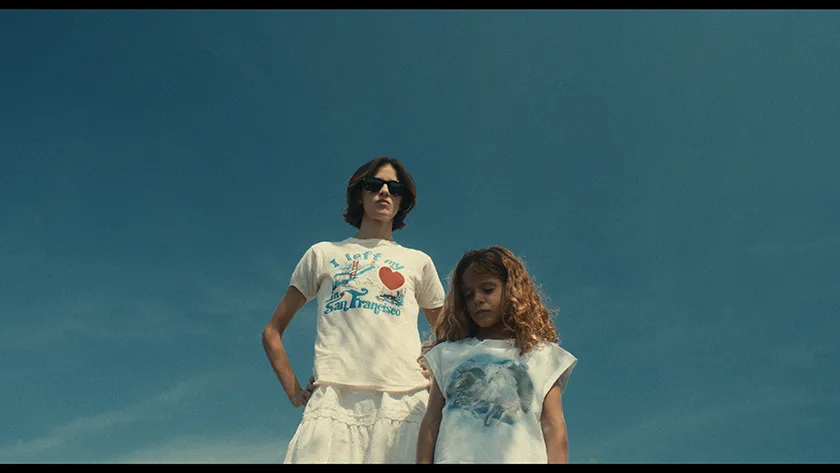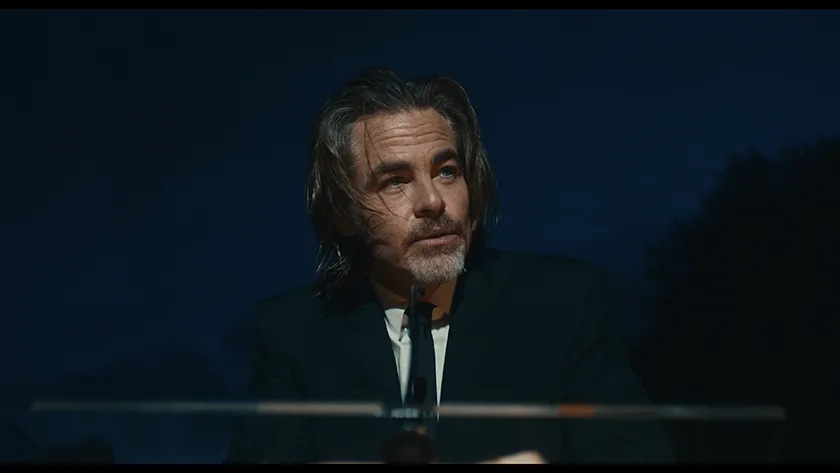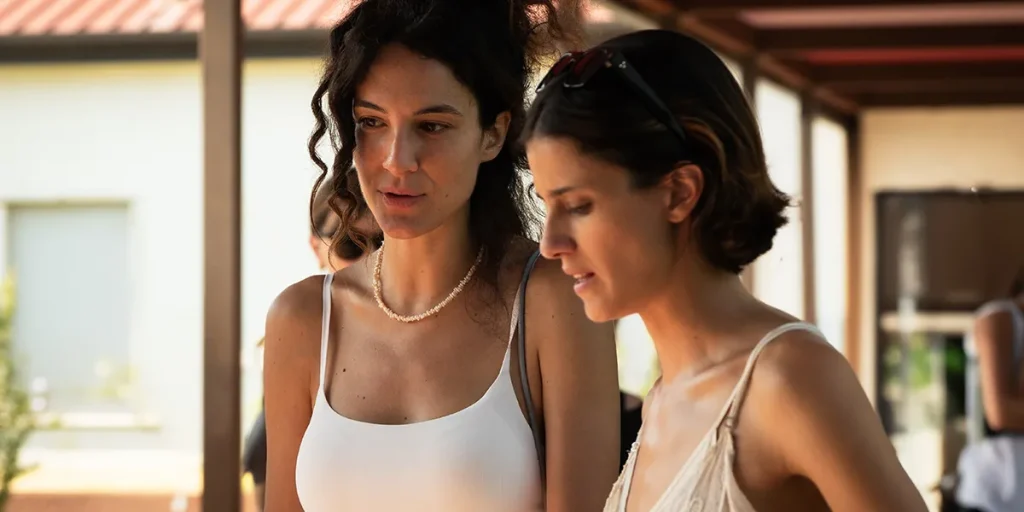We interview director and writer Carolina Cavalli about her latest film, The Kidnapping of Arabella (Il Rapimento di Arabella).
The Kidnapping of Arabella (Il Rapimento di Arabella) is Carolina Cavalli’s second feature film after her debut Amanda (2022). The movie, which had its world premiere at the 2025 Venice International Film Festival, was screened at the BFI London Film Festival on 12-13 October 2025.
Holly (Benedetta Porcaroli) is a young woman working at an ice skating rink who is extremely unhappy with how her life turned out, and Arabella (Lucrezia Guglielmino) is a kid who doesn’t like other children and has a complicated relationship with her father (Chris Pine). Their encounter in a fast-food parking lot offers them something they both need, and are looking for. Arabella sees Holly’s car as an opportunity to run away, and Holly sees her younger self and a second chance at life in Arabella.
Read the interview with Carolina Cavalli below!
Carolina Cavalli on the inspiration behind the movie
Congratulations on The Kidnapping of Arabella! How did you get the idea for this story in the first place?
Carolina Cavalli: This might be a bit trivial, but [I was thinking about how] we can always imagine different lives, but can only live one. That was interesting to me, and I wanted to see how this character would act on her feelings of being stuck in the past. She’s not able to live her life as it is, and eventually, she has to accept reality, but she also has to accept the fact that she has become an adult.
Was there any film or direction that inspired you when you were working on the movie?
C.C.: I didn’t go to film school, so I didn’t have much experience before actually directing and writing. Of course, I did start with smaller roles, but it was always through work. Everything that I do, I learned from other directors that I worked with, or from watching movies. I’ve always told myself that I had to pay attention not to have too many references, because otherwise I’d risk copying someone. Only when The Kidnapping of Arabella was finished, was I able to recognise the influences and elements that I was familiar with prior to the film.
Carolina Cavalli on the making of the film
What was the biggest challenge for you when making The Kidnapping of Arabella?
Carolina Cavalli: For me, it’s always the writing. It’s the part I like the most and feel comfortable in, because once I have a script that I’m happy with, I feel safe. But when it’s very early in the process, everything can go wrong. Mentally, it’s exciting, but there are a lot of problems that can arise, and it makes me very tense until I have the final script. It’s stressful! I know there are many more stressful things in life, but it is the hardest part.
Do you have a favourite moment on set?
C.C.: It’s always the first days, because it feels like you are entering a whole new world; it’s almost like moving to a new place. It’s very exciting and scary, and there’s so much happening too. I remember the first day of shoot for The Kidnapping of Arabella, there were so many people on set. We had Lucrezia, Benedetta, and a lot of new crew members, but also people that I knew from previous jobs. It really felt like the beginning of an adventure.
Carolina Cavalli on the actors and casting of The Kidnapping of Arabella
Lucrezia Guglielmino is really good as Arabella. Can you talk a little bit about how you worked with her to portray this character?
Carolina Cavalli: In a way, I think I gave her a lot of responsibility in the sense that I wanted to make sure that she knew she was playing a character and acting as a different person rather than being herself. I did wonder if that was something that kids can grasp, but she surprised me. She immediately realised how to pretend and really believed [in this story and this character]. Lucrezia also understood what a story is, what happens before and what happens after, and how all of this would affect her character. I know she’s a kid, but I decided from the beginning that I wanted to treat her like all the other actors in the movie.
And she does the comedy really well too; she is so funny!
C.C.: That is also her personality in real life. When we were casting, I really wanted to make sure that the actress we picked for Arabella was someone who wanted to be there. I noticed that Lucrezia really wanted this part, because she prepared so well for this audition. She even cut her hair by herself, and that made me see how much she cared about it.

How did you work on creating the family dynamic that we see between Arabella and her dad, but also the relationship she has with Holly?
C.C.: Of course, Lucrezia knew she was acting as someone else, but her relationship with Benedetta was instant on-screen. They spent a lot of time together during rehearsal, so they both managed to find the right relationship very quickly on set. Lucrezia was also looking up to Benedetta very much, especially at the beginning. Towards the end, Lucrezia felt like she was an experienced actress. Lucrezia also got along with Chris; I think they liked each other very much. But she understood that during the part of the story they were playing together, she had to try and be mad at him.
How did you cast the other characters? You have Benedetta Porcaroli, with whom you have worked before, in the cast, but also Chris Pine.
C.C.: In my opinion, Benedetta is very good at delivering lines that can seem out of place in a very natural and spontaneous way. I love how she does that. I think Holly and Arabella are very different but have certain things in common: they both live in this surreal world where such lines make perfect sense, and Benedetta really portrays that. She’s very good at showing tenderness and the weaknesses of the characters that might not be immediately likeable. I am very happy to work with Benedetta again, because we are friends now. As for Chris, I did not really expect it! They put us in touch, and I thought it was just for a chat. I knew he wanted to act in an Italian film because he speaks Italian, so I realised he would have been open to a part in a small film. I sent Chris the script of The Kidnapping of Arabella, and he liked it; I was very happy to have him [join the cast].
Carolina Cavalli on the tones and themes of The Kidnapping of Arabella
Some parts of The Kidnapping of Arabella are really sad, but you balanced the comedy elements in it very well. How did you work on including humour in this story?
Carolina Cavalli: Comedy often comes from the sad moments too; I think those can have the best humour. In the film, the humour is a little surreal, which shows the feeling of confusion and displacement that these characters, and maybe humans in general, feel . I always want to balance the absurd parts, which move away from realism, with the need to be very authentic and true to the inner life of the characters. Sometimes it comes easily, and sometimes it may be less natural because of the surreal tone, but I think these two can go well together.
Do you think that there are any connections or common elements between The Kidnapping of Arabella and your first feature, Amanda, in terms of themes and visuals?
C.C.: The theme of friendship as a relationship, and especially friendship between women who are very alone, is something that I love and is present in both films. Childhood is also always there a lot. I think it’s more evident in The Kidnapping of Arabella, but to me, it’s also very present in Amanda. The worlds of the two movies also resemble each other a little bit, because we actually reused some props and furniture from the set of Amanda. They fit very well with this film, which means that there are some similarities visually too.
Did you always know that The Kidnapping of Arabella was going to end like it does?
C.C.: No. I had that in mind, but I wasn’t sure how to deliver it. I had always imagined that Holly and Arabella would talk through a screen, but at a certain point, I did consider having them actually talk in person. In the end, I stuck to my initial idea, and I was very happy with it.
Carolina Cavalli on the setting, places, and journey portrayed in The Kidnapping of Arabella
I know that you shot The Kidnapping of Arabella in two regions of Italy: Veneto and Emilia-Romagna. How was that experience, and why did you choose these two regions in particular?
Carolina Cavalli: The Kidnapping of Arabella is set in a place that does not exist geographically, so choosing where to shoot is an arbitrary decision. Both Veneto and Emilia-Romagna have very picturesque landscapes. We are used to seeing them when we talk about Italy, but at the same time, they look like unexpected places, where you wouldn’t immediately understand where you are. That was very important to me because I was creating my own map for this film and using the spaces as I wanted in order to work with the story. For example, I put locations close to each other that would realistically not be, so it is more of an emotional landscape.
The journey in the film is both physical and metaphorical. What do you think the characters learn from each other?
C.C.: At the beginning, Arabella only sees Holly as someone who has a car and can take her away. But there is a moment in The Kidnapping of Arabella when Arabella says that she can’t leave her because Holly has no one else. I think that is where we can tell that she starts feeling closer to Holly and finds a friend in her. That’s something that Arabella needs because she always says that she doesn’t like other kids. Holly also finds something she was not looking for. At the beginning of the film, she wanted to go back to the past, but with Arabella, she finds the possibility of going ahead and moving forward. She learns that accepting her reality doesn’t mean existing passively or abandoning your dreams, but it is about being fully present and more conscious in the world and acting on it.
Did you learn anything from these characters while working on The Kidnapping of Arabella?
C.C.: I went on a journey with Holly, too. Being an adult is not something I love, but I know I have to be, and it is important for me to be responsible and aware of what happens in the world. That is probably something that I can share with her and relate to.
Carolina Cavalli on the audience’s reaction to the movie, film festivals, and what is next in her career
Once it comes out, what do you hope that audiences take away from The Kidnapping of Arabella?
Carolina Cavalli: I hope that audiences laugh a little, and I hope it makes people want to be kind. I don’t know if I will manage to do it, but that is something that I would like viewers to take away from The Kidnapping of Arabella. The film is about friendship and kindness.

The Kidnapping of Arabella premiered at the Venice Film Festival, where you also had your previous film screened. The film is about to be screened at the London Film Festival too . How does it feel to be back in Venice and on the festival circuit, and what do the film festivals mean to you?
C.C.: It was very important for me to have my first film at the Venice Film Festival. I was really excited when they told me I was going to be in Venice again with The Kidnapping of Arabella. This is not just on a personal level, but having a film at festivals can help smaller movies to be watched by many people; they are a great platform. I also thought I’d be less nervous, but on the contrary, I’m really nervous this time too!
Is there anything else you are working on, or any project you can tell us about?
C.C.: I am writing different things. I don’t know what’s is going to work or which idea I’ll work on next, but I’m writing; I try and write as much as I can. I’m not sure where I am with those. I would need to go back and see if I can gather ideas. Sometimes I write just dialogues that I’m probably never going to use, but we will see.
This interview was edited for length and clarity.
.
The Kidnapping of Arabella was screened at the BFI London Film Festival on 12-13 October, 2025.

